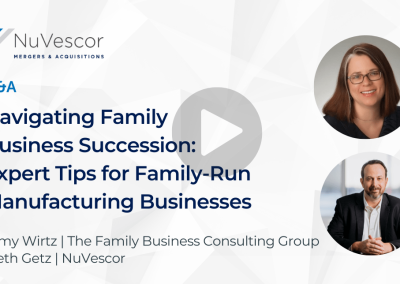M&A Guidance for the Fabricated Metal Industry
Tailored Strategies for Metal Fabrication M&A and Exit Planning
Selling your metal fabrication business shouldn’t be a nerve-wracking ordeal. You’ve poured your heart and soul into building it, and you deserve a smooth, profitable exit. At NuVescor, we recognize the unique challenges and opportunities presented by the current shifts toward automation and consolidation in the metal fabrication industry. We expertly tailor M&A strategies for metal fabrication firms so you can meet your specific business and personal goals.
Armed with extensive industry knowledge, our team can advise you on the steps that best prepare your business for sale and connect you with the right buyer, ensuring a smooth and successful transaction. We’ve helped countless owners navigate the challenges of this rapidly changing industry and secure their financial future. Let us be your partner in achieving a stress-free exit.
On-Demand Webinar
Successful Exit Strategies for Fabricated Metal Business Owners
Optimize Value for Your Metal Fabrication Business
Harness Growth with the Right Metal Fabrication Acquisition
Insights for Metal Fabrication Business Owners
Frequently Asked Questions
What is the current state of the market for selling a metal fabrication business?
The current market for selling a metal fabrication business is characterized by strong activity but with selective buyers focusing on well-prepared companies. There’s a noticeable trend of larger shops acquiring smaller ones to enhance operational efficiency through automation and scale. The industry appears fragmented, with a large number of businesses, suggesting a ripe environment for consolidation.
Additionally, a significant portion of business owners are considering exits in the near future, indicating a potential influx of businesses for sale. Buyers are particularly interested in companies that have clearly prepared for the sale process, demonstrating financial health, operational efficiency, and strategic growth potential. Moreover, strategic acquisitions are becoming common as buyers seek to expand geographically, diversify customer bases, or acquire specific technological capabilities.
Overall, the market offers opportunities but demands meticulous preparation and strategic positioning from sellers.
What are the common pitfalls in the exit process that lead to transaction failure?
Common pitfalls in the exit process that can lead to transaction failure include:
- Lack of Preparation and Unrealistic Expectations: Owners often underestimate the complexity of the sales process and the time it takes to close a deal. A lack of understanding of the market value of their business can result in unrealistic price expectations, leading to potential deals falling through.
- Inadequate Financial Documentation and Due Diligence: Incomplete or inaccurate financial records can derail the due diligence process. Buyers need transparent and comprehensive financial information to assess the business accurately. Failure to provide this can lead to loss of trust and interest.
- Failure to Identify the Right Buyer: Not all buyers are suitable for every business. Identifying a buyer whose goals, values, and expectations align with those of the selling business is crucial. A misalignment can lead to conflicts, renegotiations, and ultimately, transaction failure.
- Neglecting Business Operations During the Sale Process: Sellers sometimes focus too much on the transaction and neglect the day-to-day operations of the business. This can lead to a decline in business performance, which can be a red flag for buyers and affect the final sale terms or lead to the deal falling apart.
- Underestimating the Emotional Impact: Selling a business can be an emotional process, especially for long-time owners. Not being emotionally prepared for the sale can lead to second-guessing decisions, creating delays, or backing out of deals.
- Poor Negotiation and Deal Structuring: A successful sale requires effective negotiation to structure a deal that benefits both parties. Poor negotiation skills or a lack of understanding of deal structures can result in unfavorable terms, causing either party to withdraw.
To mitigate these risks, business owners should start planning their exit strategy well in advance, ensure financial records are thorough and accurate, carefully vet potential buyers, maintain business operations during the sale process, prepare for the emotional aspects of selling, and seek professional advice to navigate negotiations and deal structuring effectively.
What are the signs that it's the right time to sell my business?
Recognizing the right time to sell your business is crucial for maximizing value and ensuring a seamless transition. Key indicators include:
- Market Conditions: If your industry is experiencing growth, consolidation, or high demand for businesses like yours, it could be an opportune time to sell.
- Business Performance: Peak financial performance and solid operational efficiency make your business more attractive to potential buyers. Uncover opportunities to enhance your company’s worth with this online evaluation questionnaire.
- Personal Readiness: Selling should align with your personal goals and life stage. Whether it’s retirement, pursuing other interests, or health reasons, personal readiness is essential. Gauge your readiness for a business exit with this online questionnaire that evaluates a business owner’s readiness to exit their company on a personal level.
- Succession Planning: Lack of a clear internal succession or desire to maintain the business within the family can prompt a sale.
- Future Growth Prospects: If capitalizing on future growth requires more resources or expertise than you’re willing or able to provide, selling might be the best option.
How can I evaluate potential buyers to ensure a good fit for my business?
When evaluating potential buyers to ensure a good fit for your business, consider the following:
- Financial Stability and Resources: Make sure the buyer has the financial resources to complete the transaction and support the business post-acquisition.
- Strategic Alignment: The buyer’s strategic goals should align with the direction and vision of your business. A buyer who understands and values your business model, market position, and industry is more likely to be a good steward of the business.
- Cultural Fit: Assess the corporate culture of the potential buyer and how it aligns with your company’s culture. A cultural mismatch can lead to challenges in integrating teams, retaining key employees, and maintaining customer relationships.
- Track Record and Reputation: Investigate the buyer’s track record in previous acquisitions, including their approach to integration, management changes, and how they’ve managed and grown the businesses they’ve acquired.
- Long-term Plans: Understand the buyer’s long-term plans for your business. Are they looking to grow and invest in the business, or are they likely to strip assets and sell off parts of the company?
- Management Continuity: Consider how the buyer plans to handle the existing management team and staff. A buyer who intends to retain and empower the current team may ensure a smoother transition and continuity.
- Deal Structure and Terms: The terms of the deal, including the purchase price, payment structure, earn-outs, and other conditions, should be favorable and reflect the value and potential of your business.
- Due Diligence Process: A thorough and respectful due diligence process can be indicative of the buyer’s seriousness and professionalism.
Finding the perfect fit is key! Don’t just settle for any buyer. Take the time to find someone who shares your vision and values for the business. This way, the transition will be smooth, your legacy will be preserved, and your company can continue to thrive under new ownership.
What are the key financial metrics that buyers focus on in the metal fabrication industry?
In the metal fabrication industry, buyers typically focus on several key financial metrics to evaluate the health and potential of a business. These metrics include:
- EBITDA (Earnings Before Interest, Taxes, Depreciation, and Amortization): This is a common metric used to assess a company’s operating performance and profitability before the impact of financing and accounting decisions.
- Revenue Growth: Buyers look at the historical revenue growth of a company to gauge its market demand and potential for future expansion.
- Gross Margin: The gross margin reflects the efficiency of a company in producing its goods. It is a critical factor that buyers consider to understand how much profit a company makes from its core operations.
- Customer Concentration: Buyers assess the risk associated with customer concentration. A business that relies heavily on a few customers may be seen as riskier than one with a diverse customer base.
- Operating Efficiency: Operational metrics such as production throughput, capacity utilization, and lean manufacturing practices are evaluated to determine the operational effectiveness and scalability of the business.
- Working Capital Management: Effective management of working capital, including inventory turnover, receivables, and payables, indicates the company’s operational efficiency and financial health.
- Capital Expenditure Requirements: Buyers examine the capital expenditure history and future requirements to understand the investments needed for maintaining or expanding the business.
- Quality of Earnings: Buyers conduct a quality of earnings analysis to ensure the company’s earnings are sustainable, repeatable, and not subject to manipulation or one-time events.
How long should I expect the exit process to take from start to finish?
The exit process in the metal fabrication industry, from preparation to completion, typically spans a considerable timeframe. Generally, it can take anywhere from 6 to 24 months, depending on several factors. The key stages include:
- Preparation Phase: This initial phase involves getting the business ready for sale, which can include financial audits, operational improvements, and strategic positioning to enhance attractiveness to potential buyers. This preparation can take several months to a couple of years, especially if there are significant areas to address to improve the business’s value.
- Marketing and Negotiation Phase: Once the business is prepared for sale, the next phase involves marketing to potential buyers, which can take several months. This stage includes initial discussions, due diligence, and negotiations. The complexity of the business, the industry dynamics, and the alignment between buyer and seller expectations significantly influence the duration of this phase.
- Due Diligence and Closing Phase: After a buyer is identified and an initial agreement is reached, the due diligence process begins. This phase includes a thorough examination of the company’s financials, operations, legal matters, and other critical factors. Depending on the findings and the negotiation of final terms, this phase can last from a few weeks to several months.
- Post-Sale Transition: Even after the deal is formally closed, there is often a transition period where the seller helps to integrate the business with the new owners. The length of this period is negotiated as part of the sale and can range from a few months to a few years, depending on the complexity of the business and the needs of the buyer.
The exact timeline can vary based on the specific circumstances of the business, the market conditions, and the readiness of both the seller and the buyer to proceed through the stages of the deal. Engaging with experienced advisors can help streamline the process, anticipate potential hurdles, and align expectations to ensure a smoother transition and exit process. Learn more about NuVescor’s process here.





